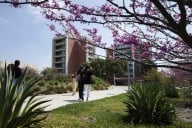You have /5 articles left.
Sign up for a free account or log in.
First Howard Stern. Now San Mateo County Community College District, which licenses the KCSM-TV PBS station in the San Francisco area.
Before the radio shock jock’s exit from terrestrial radio to the magnificent satellites in the sky, he had long been cursing what he called arbitrary decisions by the Federal Communications Commission to fine stations for broadcasting content it deemed indecent or profane.
While Stern's most recent fines were levied for broadcasting radio programs filled with references to sexual practices and the use of a personal hygiene product called "Sphincterine," San Mateo received a $15,000 fine in March 2004 for airing “ The Blues: Godfathers and Sons," which was produced by Martin Scorcese. The documentary explores the history of Chicago blues and unites veteran blues players with contemporary hip-hop artists. Several linguists and ethnographers have weighed in on the contents of the film, saying that it is culturally relevant and historically significant.
Soon after the original airing, which occurred before 9 p.m. on a weeknight, a parent in the station's broadcast area sent a letter to the FCC’s Enforcement Bureau claiming that the language in the broadcast, which included the words “motherfucker,” “bullshit” and “cocksucker,” was “indecent.” “My own child was awake,” wrote the parent, "but I kept him in the next room during the broadcast.”
Now, college officials are challenging the fine, saying that the FCC’s ruling is inconsistent with other decisions it has made, including dismissing numerous complaints nationwide when the ABC network aired the film “Saving Private Ryan” at 8 p.m. in 2004. College officials are receiving pro bono legal assistance in their efforts, and formally appealed the FCC’s ruling last week. They say that if the FCC does not reverse its decision, the college will pursue legal action.
“There are some important First Amendment issues at stake,” says Dave Mandelkern, president of the San Mateo County Community College District's Board of Trustees. “This film is far from being obscene or indecent.”
Martin Scorsese, in a letter filed with the FCC last week, said that he supported the college’s position and has “deep concern over the adverse impact that the FCC’s actions will have on the creative process generally.”
FCC officials say that, in contrast to “Saving Private Ryan,” words in the documentary could have been deleted without altering the artistic and educational nature of the film. The commission also maintains that the college violated stricter broadcast ruled imposed after the 2004 Golden Globe Awards, in which the singer Bono said the word “fuck” during a live broadcast. However, college officials note that the program was aired before this order went into affect.
Of the 348 PBS stations in the country, about 30 are licensed by colleges and universities. Officials at such institutions say they believe the FCC is on shaky ground.
“I have a whole mix of feelings,” says Dennis Haarsager, associate vice president of Washington State University’s KWSU station. “I feel really bad that the FCC has really picked on one of the least financially stable systems to go after.”
Standards, says Haarsager, seem to depend on whoever is running the FCC at the moment.
“If I was a lawyer, I would really welcome this case,” says Anthony Riddle, director of Alliance for Community Media, a public education group on electronic media. “The most important part about standards is consistency.”
Referring to the “Saving Private Ryan” decision, Riddle says that he doesn’t understand why a small community station would be held to a different standard than a giant broadcaster like ABC.
“I believe that being in a university community makes our audience more understanding of such issues,” adds Haarsager. “There’s little doubt that universities value free speech, academic freedom and journalistic integrity.”
Despite such support, some stations licensed by colleges and universities are already taking what some see as the path of least resistance.
Steve Volstad, communications director with UNC-TV, the PBS station group of the University of North Carolina system, says that the standard approach at the station is to air the edited version of productions. “There are not too many adults who can’t stay up until 10 p.m.,” he says. “Being a statewide network, we try to take into account what folks in this area would approve of.”
In the case of the blues documentary, UNC-TV officials chose to air an edited version, sans swear words, at 11 p.m.
Today, with the appeal lingering until the FCC decides to act on it, even the San Mateo station itself has headed in that direction, at least for the time being.
“We don’t think that just because we’re an educational licensee that we should have special rights,” says Marilyn Lawrence, KCSM-TV's general manager, who notes that the station’s largest audience is between 7 and 10 p.m. “I just think we have gone way too far when context isn’t taken into consideration. How do you know anymore?”
Under Lawrence’s direction, the college now follows “the letter of the law,” with no profanity airing before 10 p.m. “The documentary would now be shown after 10, whether I believe it’s the culturally correct action or not,” says Lawrence.
On Monday, FCC officials said they could not say when the appeal would be heard.








